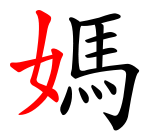Yes, I'm a Radical Learner :-)
Well, that can be taken two ways, though I don't think I'm doing anything "radical" in my learning at this stage, apart from being silly enough to attempt it!
However, I had been looking around for a nice chart I can pin up on the dunny door (dunny = toilet in Aussie English).
I'm very thankful to the fellow at MandarinPoster.com who took the effort to create and refine this poster. I'm even more grateful that he makes it available for free!
I only wish I had larger format printer, as the A4 size means I have to squint to see the tones above the Pin-Yin words.
If you're after a nice chart and you have the funds (VERY reasonable prices in my opinion), check out his shop.
What are Radicals?
Why are you asking me? Don't forget I've only been at this for just over three weeks!
But let me try to briefly explain what I know so far, and correct me if I'm wrong.
 |
| One of the Chinese words for "Mother". The red radical is "nǚ" meaning "woman". Image from Wikipedia |
Chinese script is made of a base set of 214 symbols called "radicals". These radicals get squished, contorted and shoved into different places to form an overall word. They are, therefore, the building blocks for all Chinese words.
Unfortunately for a dumb Westerner like me, these radicals do not "own" their own sounds, so it's not some magical alphabet like the ABCs which we can use to spell stuff.
So the hard work ahead is learning all these radicals, because once mastered, they often give clues to the actually meaning of the word they're used in.
Need an example? How about the Chinese word for TO HIT: 打
This word is made up of three radicals 手, 一, 亅 . The first radical in a word, from my limited experience, tends to be the important one. Here the leading radical is 手 (shǒu) meaning "hand". Hopefully this is enough to trigger your memory, that the word relates to an action using the hand and you then recall that it means "To Hit". If you're lucky.
I'm sure it's a lot more complex than that, but that's where I'm up to now.
I look forward to gaining more insight as time goes by!
What have you learnt? What methods of study to you use to aide memory retention?


